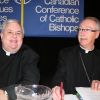Development and Peace, bishops continue close collaboration
OTTAWA - During the annual plenary of the Canadian Conference of Catholic Bishops (CCCB) in Ste. Adele, Que., Sept. 24-28, the bishops reaffirmed their ongoing collaboration with their overseas development agency, both respecting its lay-run character and ensuring its Catholic identity.
The lay-run character of the Canadian Catholic Organization for Development and Peace came under fire in recent weeks when its fall education campaign was put on hold after several bishops objected to the campaign for being too political, as first reported in The Catholic Register. The National Post and its sister papers picked up on the story Sept. 26.
The stories saying the bishops intervened, blocked or stopped the fall program are inaccurate, said CCCB president Archbishop Richard Smith in a post-plenary interview from Edmonton Oct. 1.
“The most important thing to emphasize is the bishops are working with D&P on their fall campaign,” said Smith.
The bishops support the principle of D&P’s annual fall educational campaign which raises consciousness about the needs in the developing world “to make people aware of the plight but also the reasons behind it,” he said.
D&P can embark on education programs, but when the strategy includes working through the parishes in local dioceses, “nothing should be taking place without the consent of the local bishop,” he said.
This year’s fall campaign departed from D&P’s plan of focusing on environmental themes to raising questions about Canada’s international aid policies, following substantial reductions in CIDA grants over the next five years. The agency, founded by the bishops more than 40 years ago, was “formulating a campaign as part of a broader movement of development agencies,” Smith said.
“Some of the material was becoming a little more direct political lobbying than we’re accustomed to,” Smith said. Some bishops, Smith included, expressed concern the materials might cause divisiveness in parishes and among donors.
The bishops must ensure “whatever’s done fosters the unity of the Church and is in no way divisive,” he said.
Smith said he spoke to the leadership of D&P about the concerns, which they received graciously, openly and with a “readiness to understand.”
D&P’s leadership “gave some thought to the impact on the life of the Church” of their campaign and told the bishops they would “adjust their literature to reflect their concerns.”
The bishops also heard a report from Toronto Auxiliary Bishop John Boissonneau, from the Liaison Committee composed of D&P leadership and the CCCB’s Standing Committee on Development and Peace, about the progress of documents outlining the principles guiding D&P’s relationship with its overseas partners, contracts with partners, the integration of Pope Benedict XVI’s social justice encyclical Caritas in Veritate into the agency’s work and the training of its staff.
Smith said the documents are “close to final draft stage” and “are still being reviewed.”
In other plenary news, the bishops approved next year’s budget and saw nothing unusual in the present financial pictures of the conference. There will be no hike this year in the per capita rates charged dioceses based on the numbers of Catholics living there.
The bishops also had an off-the-record meeting with Immigration Minister Jason Kenney and that went well, Smith said.
“The conversation was very respectful, open and very frank... It was a welcome opportunity to speak to the minister as a voice for the voiceless,” Smith said. “He certainly did hear us.”
The bishops also marked the upcoming 50th anniversary of the opening of the Second Vatican Council. Smith spoke of how Pope Benedict XVI in his emphasis on the Year of Faith is the clearest voice calling for people to read and understand the documents of the Second Vatican Council so the new evangelization can be based on the beauty of the Catholic faith articulated in them.


